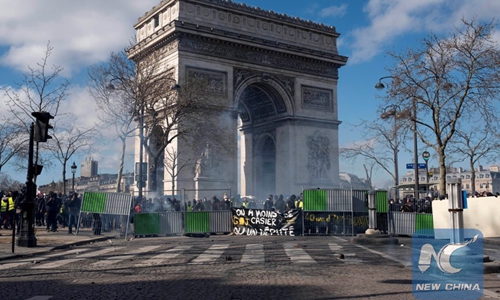HOME >> OPINION
2019 protests test each country’s tenacity
Source:Global Times Published: 2019/12/25 21:43:42

"Yellow Vest" protesters clash with riot police at the Arc de Triomphe in Paris, France, on March 16, 2019. French police arrested more than 200 people on Saturday after violence broke out in Paris in a fresh protest of "Yellow Vest" movement. Phoyo: Xinhua/Alexandre Karmen
The unrest in Hong Kong, sparked by the now-withdrawn extradition bill, posed a severe challenge to China in 2019. It is perhaps sort of a relief for us to notice that protests hit a lot of places across the world including Paris, London, and Barcelona in Europe, many cities in Oceania, the Americas and Africa, as well as India and Thailand near China. Some Western media outlets even compared 2019 to 1848 in Europe or the turbulent period right after World War I.Large-scale protests around the world result from various reasons and a regular pattern can hardly be observed. Only a few of the demonstrations had the slogan claiming "democracy" and "freedom," and such a banner was often not quite consistent with those movements' actual situations.
Many protests were triggered by pension reform, fuel price hikes and even a rise in subway ticket prices. And violence has become a prominent trend in this wave of protests. Demonstrators from various countries and regions have imitated and learned from each other.
Globalization has seemingly widened the wealth gap. The internet has facilitated the gathering of anger and discontent, and influential Western public opinion has adopted double standards toward protests. These can be concluded as the basic causes of the rapid spread of protests and an unpromising future.
With the development of civil rights around the globe, ideology often shows more sympathy for protests than opposition to them, at least in the early stages of their outbreaks. In most places, the cost of conducting radical activities is relatively low. And many countries and societies are nonplussed over how to meet protesters' demands.
The causes of many 2019 protests seemed insignificant, and the political system backgrounds in which these protests took place cover almost all existing governance patterns in the current world. This indicates that how to prevent and resolve such destructive protests has become a task that all societies should seriously reckon with. China is no exception.
In 2019, the Chinese mainland's system superiority helped the society respond soundly to the US-launched trade war, prevented Hong Kong's turmoil from spreading to the mainland and enabled the country to independently take necessary governance measures on the Xinjiang affairs so that peace and stability have been consolidated in the whole region.
Looking ahead, China needs to get the following jobs well done. They are well within China's institutional capabilities.
First, the country should keep focusing on people's livelihood and comforting public emotions. This has always been China's strong point. Although China's public opinion is under regulation, the government pays close attention to each trend in the realm of public opinion. As long as an opinion makes sense, policy adjustments will be made quickly. Whereas in the West, people express whatever they want, but that can hardly produce any effect.
While maintaining this well-established tradition, governments at all levels throughout China must follow the mass line when introducing a new policy and promoting a new project. The lower-level authorities should never arbitrarily act on behalf of the people.
Second, the country needs to further improve the mass work network in the social governance system. China's concept of "mass" is unique, with an implication of care and help from the system as well as cohesion and solidarity. This can help open up a critical communication channel at the critical juncture. In the process of expanded protests, a large number of irrational factors tend to foment. The mass work will strongly suppress those irrational emotions incited by forces with ulterior motives.
Third, the country should constantly promote positive energy while strengthening society's bearing capacity. Strong positive energy is the foundation for a society to maintain stability, but it is also of great significance to enhance social tolerance facing various situations.
China has truly created a miracle of long-term economic development and long-term social stability. The well-being of all Chinese people lies in the continuation of this miracle.
As China moves forward, its system advantages will be increasingly prominent. The country has sufficient conditions to have the last laugh.
Posted in: EDITORIAL